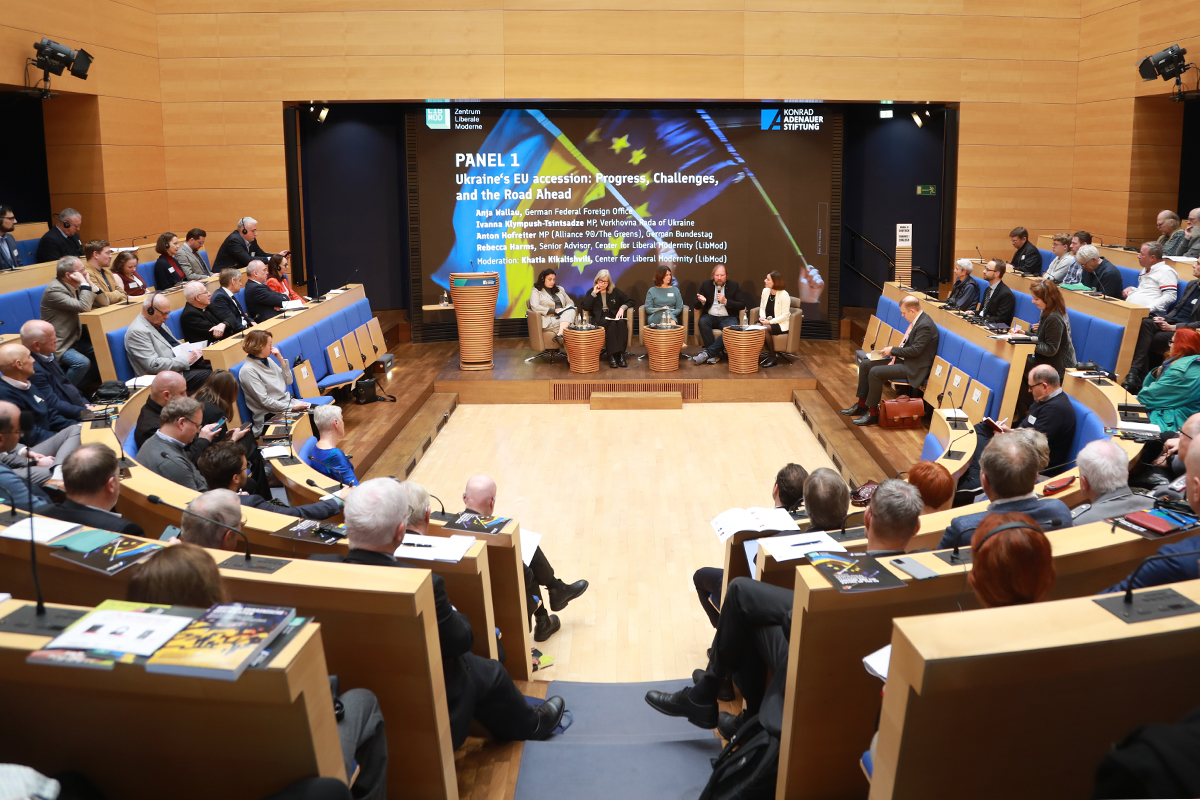Green Energy Transition in Ukraine: Communal Level

On February 28th LibMod organised a workshop on the Green energy transition in Ukrainian communities to discuss current legislative frameworks and practical local experiences of small distributed generation in municipalities with lawmakers and experts from Ukraine and the EU. Decentralized energy can benefit communities through strengthening their resilience and security, reducing electricity costs, and increasing investments and local ownership. Since the Russian war of aggression, municipal owned enterprises and local ownership of renewable energy have become highly important.
Decentralizing Ukrainian energy supply
The adoption by the Verkhovna Rada of the Law “On Amendments to Certain Laws of Ukraine on the Restoration and Green Transformation of the Energy System” No. 3220 of 30.06.2023 was a welcome and long-awaited step towards the adaptation of Ukrainian legislation to the EU Fourth Energy Package. The law holds many innovations for renewable energy sources, which have significantly expanded the scope of involvement of consumers wishing to install power generating facilities (also known as active consumers or prosumers). Municipal owned entities (MOEs) can become prosumers too, which allows for more active involvement of communities in the energy sector.
Currently, communities do not use the active consumer model, and each individual MOE purchases its entire electricity volume on the market through market mechanisms and under the restrictions established by public procurement legislation.
We discussed the benefits of the active consumer model, application options and regional challenges. Andriy Gerus (Chairman, Verkhovna Rada Committee on Energy, Housing and Utilities), Oleksandr Vizir (head, NGO Association on energy efficiency and energy saving, author of “Small Distributed Generation. A Window of Opportunity for Ukraine: Focus on Communities”), Rouven Stubbe (Consultant, Energy and Climate Policy team, Berlin Economics), and Andriy Martyniuk (Executive Director, Ukrainian NGO Ecoclub Rivne joined as speakers in the discussion moderated by Daria Malling (LibMod).
Municipal Owned enterprises as Active Consumers
We discussed how the new law can be implemented in Ukrainian communities and what role it plays in promoting the green energy transition. The creation of prosumers by communities can positively effect communities in three ways:
- security (strengthening the system’s resilience in the event of a power outage);
- economy (reduction of electricity costs for community entities);
- investment (the possibility of attracting investment in relevant community programmes).
Option 1 to create active consumers is to install power generation facilities at the expense of the community, or by using donor funds. Such MOEs can install renewable generation units that are directly connected to their internal power grids and consume most of the electricity produced at the point of production (directly by the facility on the roof of which the generating unit is located) or close to it, thus creating a classic distributed generation.
This will reduce the cost of purchasing electricity and makes it possible to create energy islands in the future, making the community’s energy system more resilient to security risks.
Option 2 is to compile a register of locations where the investor has the right to install power generation units and connect them to the MOE’s internal networks, which will allow such MOEs to obtain the status of active consumer.
The community may hold open tenders (e.g. on the Prozorro platform) for investors, offering to build a regional power generation facility, potentially guaranteeing investors that the MOE will buy the electricity produced at a certain price.
Option 3, the most efficient one, is a combination of the two. To further develop this logic, it is important that the surplus electricity produced but not consumed by MOEs is sold to other MOEs in the community. For this purpose, several significant changes should be made to the model of electricity procurement by municipalities as suggested by Oleksandr Vizir.
Firstly, it is necessary to reduce the population threshold to establish a central procurement organization (CPO), or to use the existing CPOs. Currently, only hromadas (Ukrainian for “communities”) with a population of over 1 million residents can do this, and therefore most hromadas cannot use this framework. Another possibility would be for associations of municipalities to have one central purchasing organisation.
Secondly, communities must be allowed to create their own balancing group and join another, so that they can maximise the economic effect of these groups and use the available electricity resource to cover their own needs. It should also be possible for community entities to quickly move from one balancing group to another — in fact, the territorial hromada’s party that is responsible for the balance will be moving. Balancing groups can be formed within but also across communities.
Benefits and practical aspects of the energy transition at the communal level
The practical benefits that can be achieved for communities by using the active consumer model are diverse:
- Electricity can become 5–10% cheaper, if 20–30% of annual consumption is covered by the installed power units.
- Municipal owned entities can acquire electricity from one supplier though one entity. They can achieve significant economic benefits as prices will be lower for large volumes of electricity.
- Less bureaucracy and people involved in the procedures and better procurement specialists.
- Overcoming the bottleneck of financing RES-projects. Creation of investment possibilities for business in communities.
According to Andriy Martyniuk, who works on promoting renewable energy and implementing RES in communities, the main motivation of municipal decision makers is the cost efficiency of using renewables and an alternative energy supply in case of a black out. Since the beginning of the full-scale invasion, local authorities significantly changed the attitude towards renewables as they realised that they can be a back-up power source for critical infrastructure. At the same time, the payback period for the on-grid solar power plants in hospitals and water utilities is only around 3–5 years.
While working with municipalities some typical challenges should be considered:
- Lack of capacities and the need for training the staff responsible for the maintenance of power units and energy management.
- The condition of roofs, buildings, electrical wiring or water utility infrastructure can be a major limiting factor.
- It is unrealistic for MOEs to supply electricity to the grid under current regulations.
- Energy use schedules of hospitals, schools, kindergartens, etc. do not coincide with the generation schedules of solar power plants and installing storage capacities is not economically advantageous. The main motivation for installing batteries is providing security of supply and stability of performance on cloudy days.
Even though renewable energy started playing an important role in securing power supply since the energy system is under Russian attack, there is still a need for raising awareness and helping communities understand the benefits of the green energy transition. High-quality calculations and clear understanding of the new regulatory framework might be helpful. It is also crucial that municipalities actively participate in obtaining financing outside or inside their community and develop a sense of ownership.
The challenges listed above and the suggestions for the regulatory framework are applicable for the municipal owned enterprises, while the situation in the residential sector is different. The classic feed-in-tariff (“green tariff”) remains much more attractive for residential consumers than the net billing scheme. And with very low prices for electricity there are currently no incentives for self-consumption for residential consumers. The system is not functioning efficiently as it incentivizes consumption in the peak hours thus increasing balancing costs and the system’s peak load. Rouven Stubbe from Berlin Economics suggested that a solution would be to phase out residential subsidies gradually while supporting vulnerable households (using independent support schemes, which offer a budget neutral way or budget positive way and are far fairer).
![]()
Did you like this article? If yes, you can support the independent editorial work and journalism of LibMod via a simple donation tool.
Donate via PayPal
![]()
We are recognized as a non-profit organization, accordingly donations are tax deductible. For a donation receipt (necessary for an amount over 200 EUR), please send your address data to finanzen@libmod.de
Related topics
order Newsletter
Stay tuned with our regular newsletter about all our relevant subjects.





